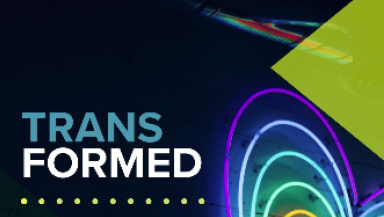The Evangelical Alliance has produced a guide to help churches grappling with transgender.
Transformed is out today and according to its author Peter Lynas is aimed at making a contribution to wider debates in an area in which there is widespread confusion.
The booklet begins with an overview of transgender in today's culture, noting that 'in recent years the trans conversation has shifted quickly raising new issues and questions for Christians and others'. It explores the nature of 'trans experience', noting that it is 'best understood as an umbrella term for those who experience their gender identity differently to their biological sex'. It distinguishes between the medical condition gender dysphoria, gender incongruence 'to a degree' and the 'transgender ideological movement'.
A section on 'What does the Bible say?' briefly discusses texts such as the story of the Ethiopian eunuch in Acts 8. It also outlines the 'big story', referring to Vaughan Roberts' book Transgender, which draws on the creation narrative in Genesis to stress the priority of 'two distinct and compatible biological sexes'. 'Cross-gender identification is a concern because it distorts the creational order of male and female,' the booklet says. It continues: 'As we continue to live in a fallen world, we will struggle between our desires and the will of God.'
The booklet considers 'key ideas' for Christians, namely the body – an 'integral part of our being'; the fundamental binary distinction between male and female in Genesis, 'a signifier both of fundamental reality... and our future destiny (when the marriage of Christ and his bride, the Church, will take place)'. It also urges acceptance of 'biblical' norms about gender, saying Christians should not 'unwittingly accept society's stereotypes about sex and gender'. It critiques the culture's individualism, which 'emphasises chosenness over givenness', and draws a parallel with the ancient philosophy of Gnosticism, which claims a 'secret knowledge', relating this to some transgender people's view that there is a 'real me' trapped in the wrong body.
In a section on how the church can respond pastorally, the booklet draws on the work of Mark Yarhouse, who distinguishes between three 'frameworks' – 'integrity', which speaks of the sacred integrity of maleness and femaleness in creation, 'disability', which sees gender dysphoria as a non-moral disability, and 'diversity', which sees transgender issues as something to be celebrated. Yarhouse suggests an 'integrated framework' and a compassionate and cautious approach.
There are also sections exploring the issue of 'naming', in which churches might struggle with what to call a transgender person, and practical steps around issues such as baptism or lavatory facilities. Another section considers the scientific data around transgender and therapeutic interventions, including what happens to children, and there are also sections on the law and free speech and on cultural trend. It concludes with a glossary and further resources.
Speaking to Christian Today, Lynas – director of the EA in Northern Ireland – said pastors, teachers and youth leaders were increasingly asking the Alliance for more information on transgender issues
It was particularly a live issue in schools, he said: 'Over half the secondary schools in Northern Ireland would have at least one transgender person.'
He stressed the need for compassion, but said, 'We want to stress that there is a biblical framework around this pastoral guidance and we need to get that truth and grace balance, which can be quite difficult.'
While he said the contribution the Bible had to make the debate was 'maybe not as simple as for some other issues', he said: 'Biblically the biological sex reveals and determines gender. The male and female of Genesis 1 become the man and woman of Genesis 2.'

Lynas said it was important to treat each person with compassion and recognise that each case was individual. However, he said that in a pastoral relationship there would need to be 'integrity moments'. 'At some point you have to have the conversation,' he said, adding: 'That's not going to look identical for everyone, but I hope it's going to be a redemptive, transformative experience.'
He said of surgery to alter gender: 'I can't see how that would ever be appropriate for somebody following Jesus, or from a faith perspective. I understand that as an adult, somebody can ultimately do what they like, but can I support them in it? I just don't know of any rationalisation or way in which that fits with the biblical text.'
However, he said: 'We are not the only voice in these conversations – healthcare professionals, families and others are going to be voices at the table. We have to engage with other professionals in that conversation.'
The Transformed booklet is part of a range of resources being created by the Alliance which will include video interviews and a talk.













